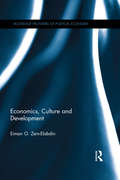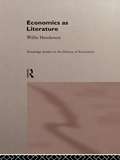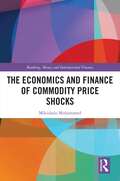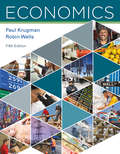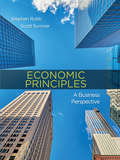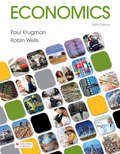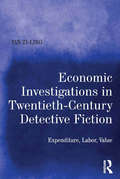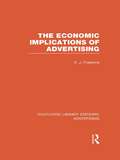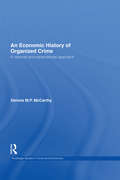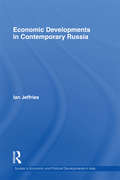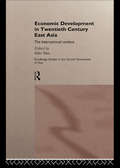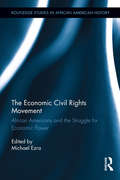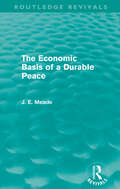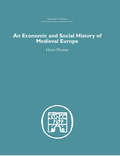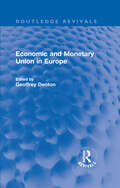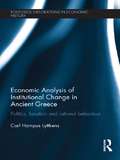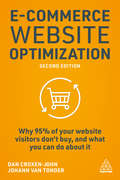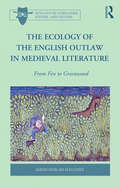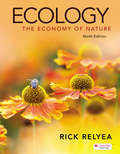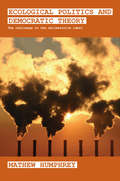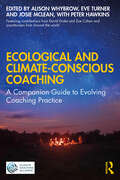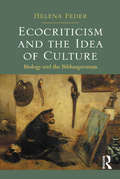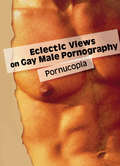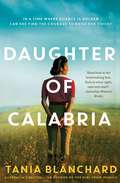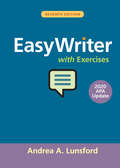Special Collections
Benetech’s Global Certified Accessible Titles
Description: Benetech’s GCA program is the first independent third-party EPUB certification to verify ebook accessibility. By creating content that is born accessible, publishers can meet the needs of all readers. Learn more: https://bornaccessible.benetech.org/
- Table View
- List View
Economics, Culture and Development
by Eiman O. Zein-ElabdinThis book examines the treatment of culture and development in the discipline of economics, thereby filling a conspicuous gap in current literature. Economics has come a long way to join the ‘cultural turn’ that has swept the humanities and social sciences in the last half century. This volume identifies some of the issues that major philosophies of economics must address to better grasp the cultural complexity of contemporary economies. This book is an extensive survey of the place of culture and development in four theoretical economic perspectives—Neoclassical, Marxian, Institutionalist, and Feminist. Organized in nine chapters with three appendices and a compendium of over 50 interpretations of culture by economists, this book covers vast grounds from classical political economy to contemporary economic thought. The literatures reviewed include original and new institutionalism, cultural economics, postmodern Marxism, economic feminism, and the current culture and development discourse on subjects such as economic growth in East Asia, businesswomen entrepreneurs in West Africa, and comparative development in different parts of Europe. Zein-Elabdin carries the project further by borrowing some of the insights from postcolonial theory to call for a more profound rethinking of the place of culture and of currently devalued cultures in economic theory. This book is of great interest for those who study Economic development, International relations, feminist economics, and Economic geography
Economics as Literature
by William HendersonA rich vein of economics writings which runs through the nineteenth century and beyond is now largely ignored because its authors were women or because they favoured literary over scientific forms. Economics as Literature re-examines some of the most interesting texts from within this tradition.The works considered include:*stories (eg by Maria Edgeworth and Harriet Martineau)*dialogues (eg by Jane Marcet and Thomas de Quincey)*'imaginative' writing (eg from Ruskin and Francis Edgeworth)*Keynes' General Theory which is locked within a nineteenth century 'tradition' of uniting science and art.
The Economics and Finance of Commodity Price Shocks
by Mikidadu MohammedThe behaviour of commodity prices never ceases to marvel economists, financial analysts, industry experts, and policymakers. Unexpected swings in commodity prices used to occur infrequently but have now become a permanent feature of global commodity markets. This book is about modelling commodity price shocks. It is intended to provide insights into the theoretical, conceptual, and empirical modelling of the underlying causes of global commodity price shocks. Three main objectives motivated the writing of this book. First, to provide a variety of modelling frameworks for documenting the frequency and intensity of commodity price shocks. Second, to evaluate existing approaches used for forecasting large movements in future commodity prices. Third, to cover a wide range and aspects of global commodities including currencies, rare-hard-lustrous transition metals, agricultural, energy, and health pandemics. Some attempts have already been made towards modelling commodity price shocks. However, most tend to narrowly focus on a subset of commodity markets, i.e., agricultural commodities market and/or energy market. In this book, the author moves the needle forward by operationalizing different models, which allow researchers to identify the underlying causes and effects of commodity price shocks. Readers also learn about different commodity price forecasting models. The author presents the topics to readers assuming less prior or specialist knowledge. Thus, the book is accessible to industry analysts, researchers, undergraduate and graduate students in economics and financial economics, academic and professional economists, investors, and financial professionals working in different sectors of the commodity markets. Another advantage of the book’s approach is that readers are not only exposed to several innovative modelling techniques to add to their modelling toolbox but are also exposed to diverse empirical applications of the techniques presented.
Economics
by Paul Krugman and Robin WellsWhile we were driven to write this book by many small ideas about particular aspects of economics, we also had one big idea: an economics textbook should be built around narratives, many of them pulled from real life, and it should never lose sight of the fact that economics is, in the end, a set of stories about what people do.
Many of the stories economists tell take the form of models—for whatever else they are, economic models are stories about how the world works. But we believe that student understanding of and appreciation for models are greatly enhanced if they are presented, as much as possible, in the context of stories about the real world that both illustrate economic concepts and touch on the concerns we all face living in a world shaped by economic forces.
You’ll find a rich array of stories in every chapter, in the chapter openers, Economics in Actions, For Inquiring Minds, Global Comparisons, and Business Cases. As always, we include many new stories and update others. We also integrate an international perspective throughout, more extensively than ever before. It starts with a new introduction and an opening story on China’s Pearl River Delta that sets the stage for new attention to China’s ascendance in the global economy. An overview of the types of narrative-based features in the text is on p. viii.
We also include pedagogical features that reinforce learning. For example, each major section ends with three related elements devised with the student in mind: (1) the Economics in Actions: a real-world application to help students achieve a fuller understanding of concepts they just read about; (2) a Quick Review of key ideas in list form; and (3) Check Your Understanding self-test questions with answers at the back of the book. Our thought-provoking end-of-chapter problems are another strong feature. The Work It Out feature appears in all end-of-chapter problem sets, offering students online tutorials that guide them step-by-step through solving key problems. With the Fifth Edition, a new feature, Discovering Data exercises, offers students the opportunity to use interactive graphs to analyze interesting economic questions. An overview of the text’s tools for learning is on p. ix.
Economics
by Rubb SumnerEconomic Principles: A Business Perspective leverages student fascination with business by drawing clear connections between fundamental economic theory and the business decisions that students—whether they are future CEOs, small business owners, managers, or independent workers—will make in their careers.
Economics
by Paul Krugman and Robin WellsWith its signature storytelling style and coverage of current issues and events, Nobel laureate and New York Times columnist Paul Krugman and co-author, Robin Wells’s best-seller is the most effective textbook available for explaining how economic concepts play out in our world. This new edition offers incisive new insight into market power and externalities in microeconomics, updated analysis of long-run growth, and extensive coverage of the economic impacts and policy responses to the coronavirus pandemic in macroeconomics.
Economic Investigations in Twentieth-Century Detective Fiction
by Yan Zi-LingIn his study of Golden Age and hard-boiled detective fiction from 1890 to 1950, Yan Zi-Ling argues that these two subgenres can be distinguished not only by theme and style, but by the way they structure knowledge, value, and productive labour. Using the detective as a reference point and enactor of socially based interests, Yan shows that Golden Age texts are distinguished by their conservationism (and not only by their conservatism), with the detectives’ actions serving to stabilize institutions with specific ideological aims. In contrast, the criminal investigations of the hard-boiled detective, who is poorly aligned with institutions and strong interest groups, reveal the fragility of the status quo in the face of escalating cycles of violence. Key to Yan’s discussion are theories of exchange, value, and the gift, the latter of which he suggests is more akin to detective work than is wage labour. Analyzing texts by a wide range of authors that includes Arthur Conan Doyle, Agatha Christie, Dashiell Hammett, Raymond Chandler, Dorothy Sayers, Raoul Whitfield, George Harmon Coxe, and Mickey Spillane, Yan demonstrates that the detective’s truth-generating function, most often characterized as a process of discovery rather than creation, is in fact crucial to the institutional and class-based interests that he or she serves.
The Economic Implications of Advertising
by Otto John FirestoneIs advertising a factor that contributes to rising costs and prices? This study, commissioned to answer just that question by the Institute of Canadian Advertising, examines the effect of advertising on the Canadian economy, on business, the consumer, costs and prices, productivity, competition, employment, social welfare and economic growth. The Economic Implications of Advertising provides a valuable insight into a little-studied area of advertising, and will be of great interest to students of the industry everywhere. First published in 1967.
An Economic History of Organized Crime
by Dennis M. McCarthyThis book is a comparative study of organized crime groups from five different parts of the world: Europe; North America; Central America/South America/Caribbean basin; Africa; and Asia/Western Pacific. Each part contains two case studies and a shorter essay, a vignette. From Europe the case studies focus on the Italian mafias and the Russian mafia; the vignette, on the Albanian mafia. From North America the case studies highlight the US Mafia and the Mexican drug cartels; the vignette, organized crime in Canada. From Central America/South America/Caribbean basin the case studies concentrate on the Colombian drug cartels and gangs of the Caribbean; the vignette, on organized crime in Cuba. From Africa the case studies examine resource wars and Somali piracy; the vignette, relations among international drugs trafficking, organized crime, and terrorism in North and West Africa. And from Asia/Western Pacific the case studies spotlight the Chinese Triads and Japanese Yakuza; the vignette, relations among international drugs trafficking, organized crime, and terrorism in Afghanistan. Written in non-specialist language, An Economic History of Organized Crime provides an original overview of a crucial problem of our times: the growing scourge of global organized crime. This book can be read with profit by the general public, but it also has value for academic specialists and professionals in law enforcement.
Economic Developments in Contemporary Russia
by Ian JeffriesThis book provides a comprehensive overview of Russia’s difficult economic transition from a command economy since the early 1990s. It covers the financial crisis of August 1998 and the global financial crisis a decade later. Key subjects covered include economic transition, privatization and liberalization; changes in land ownership and agriculture; energy; foreign direct investment; economic stabilization; and economic performance. Russia is well endowed with raw materials, especially oil and natural gas; this book argues that in some ways this has not helped Russia’s attempts to become a more diversified and high-tech economy. Overall, the book demonstrates how much the Russian economy has changed in the period. It continues - and adds to – the overview of developments in the author’s The New Russia (2002), and is the companion volume to Political Developments in Contemporary Russia (2011) - both published by Routledge.
Economic Development in Twentieth-Century East Asia
by Aiko IkeoThis collection supplies fascinating insights into aspects of East Asian economic development. It will interest scholars in a variety of related fields and provoke further research and debate.
The Economic Civil Rights Movement
by Michael EzraEconomic inequalities have been perhaps the most enduring problem facing African Americans since the civil rights movement, despite the attention they have received from activists. Although the civil rights movement dealt successfully with injustices like disenfranchisement and segregated public accommodations, economic disparities between blacks and whites remain sharp, and the wealth gap between the two groups has widened in the twenty-first century. The Economic Civil Rights Movement is a collection of thirteen original essays that analyze the significance of economic power to the black freedom struggle by exploring how African Americans fought for increased economic autonomy in an attempt to improve the quality of their lives. It covers a wide range of campaigns ranging from the World War II era through the civil rights and black power movements and beyond. The unfinished business of the civil rights movement primarily is economic. This book turns backward toward history to examine the ways African Americans have engaged this continuing challenge.
The Economic Basis of a Durable Peace
by James E. MeadeFirst published in 1940, this book suggested the basic principles upon which a new international economic order should be built at the end of the Second World War. Particular attention is paid to the possibility of constructing such an international order on the basis of divergent national economic systems – whether liberal or planned, capitalist or socialist. In undertaking this task the author combines theoretical analysis with a description of the immediate pre-war economic situation and writes in a language which is equally accessible to the economist and the layman.
Economic and Social History of Medieval Europe
by Henri PirenneFirst published in 2005. Routledge is an imprint of Taylor & Francis, an informa company.
Economic and Monetary Union in Europe
by Geoffrey DentonIn its pursuit of economic integration, economic and monetary union (EMU) had become a primary commitment for the European Community. Originally published in 1974, this study sets out to examine the meaning of economic union and its relationship with monetary union. The contributors look at the problems and costs for attaining economic union for the member states of the EEC at the time. Steven Robson writes on economic management. Paul Woolley examines the integration of capital markets. Santosh Mukherjee looks at the implications of labour market policy. Geoffrey Denton and Adam Ridley consider the impact of economic and monetary union on regional problems. Alan Prest is concerned with tax harmonisation specifically Value Added Tax and Corporation Tax and Douglas Dosser discusses the development of a European Community budget. Though the long-term benefits of EMU were clear, in the short term it would impose strains and pressures on national economies and particular sectors within them. This study goes a long way to clarifying where these difficulties would arise and suggests some ways of coping with them.
Economic Analysis of Institutional Change in Ancient Greece
by Carl Hampus LyttkensThis book presents an economic analysis of the causes and consequences of institutional change in ancient Athens. Focusing on the period 800-300 BCE, it looks in particular at the development of political institutions and taxation, including a new look at the activities of individuals like Solon, Kleisthenes and Perikles and on the changes in political rules and taxation after the Peloponnesian War.
E-Commerce Website Optimization
by Dan Croxen-John and Johann van TonderConversion rate optimization (CRO) is a complex field and one that is rapidly evolving. It's about understanding people and their behaviour, not simply website visits. E-commerce Website Optimization provides an all-encompassing guide, explaining the how and why, before focusing on techniques and tools to increase the percentage of visitors who buy from the site, and subsequently the amount that these visitors spend when they buy. Grounded in best-practice theory and research, it brings together usability, analytics and persuasion to offer a detailed, step-by-step guide to improve conversion rates, increase ROI from online marketing campaigns, generate higher levels of repeat business and increase the e-commerce value of websites. In the fast-moving world of e-commerce, this fully revised second edition includes updates on test metrics, prioritization and personalization, as well as a new chapter on persuasive copywriting. Alongside updated case studies and newly recommended tools, E-commerce Website Optimization is an invaluable book for those seeking to implement a data-driven ethos for their organization's e-commerce programme, for everyone from chief digital officers and heads of online sales, to entrepreneurs and small business owners.
The Ecology of the English Outlaw in Medieval Literature
by Sarah Harlan-HaugheyArguing that outlaw narratives become particularly popular and poignant at moments of national ecological and political crisis, Sarah Harlan-Haughey examines the figure of the outlaw in Anglo-Saxon poetry and Old English exile lyrics such as Beowulf, works dealing with the life and actions of Hereward, the Anglo-Norman romance of Fulk Fitz Waryn, the Robin Hood ballads, and the Tale of Gamelyn. Although the outlaw's wilderness shelter changed dramatically from the menacing fens and forests of Anglo-Saxon England to the bright, known, and mapped greenwood of the late outlaw romances and ballads, Harlan-Haughey observes that the outlaw remained strongly animalistic, other, and liminal. His brutality points to a deep literary ambivalence towards wilderness and the animal, at the same time that figures such as the Anglo-Saxon resistance fighter Hereward, the brutal yet courtly Gamelyn, and Robin Hood often represent a lost England imagined as pristine and forested. In analyzing outlaw literature as a form of nature writing, Harlan-Haughey suggests that it often reveals more about medieval anxieties respecting humanity's place in nature than it does about the political realities of the period.
Ecology
by Rick Relyea and Robert RicklefsEcology: The Economy of Nature provides a solid foundation for your understanding of ecology. A fascinating narrative that makes you want to keep reading this clearly written text that combines the latest research with features that will help you increase your understanding of quantitative tools and analysis that ecologists use every day.
Ecological Politics and Democratic Theory
by Mathew HumphreyThis volume examines the reasons why some despair at the prospects for an ecological form of democracy, and challenges the recent ‘deliberative turn’ in environmental political thought. Deliberative democracy has become popular for those seeking a reconciliation of these two forms of politics. Demand for equal access to a public forum in which the best argument will prevail appears to offer a way of incorporating environmental interests into the democratic process. This book argues that deliberative theory, far from being friendly to the environmental movement, shackles the ability those seeking radical change to make their voices heard in the most effective manner. Mathew Humphrey challenges beliefs about the relationship between ecological politics and democracy at a time when those who take direct action are being swept up in the War on Terror. By calling for a more open and contested form of democracy, in which the boundaries of what constitutes ‘acceptable’ behaviour are not decided in advance of actual debate, Ecological Politics and Democratic Theory is an original contribution to the literature on environmental politics, ecological thought and democracy.
Ecological and Climate-Conscious Coaching
by Peter Hawkins and Alison Whybrow and Eve Turner and Josie McLeanThis book takes you on a seven-day journey with your guides: 60 coaches and thought-leaders from around the world. Through storytelling, poetry and other creative approaches, readers can follow this programme alone or with others and take a practical and empowering look at the impact of the climate emergency on their practice and how they might respond. Ecological and Climate-Conscious Coaching: a Companion Guide to Evolving Coaching Practice describes methods for adapting your practice while making a livelihood, reframing your work with urgency and action through exploration of the five-stage ‘Eco-phase’ cycle, moving from ‘Eco Curious’, ‘Eco-Informed’, ‘Eco-Aware’, to ‘Eco-Engaged’ and ‘Eco Active’. Designed to encourage discussion, raise awareness and increase confidence about stepping into a leadership role, the book explores the difference that coaching can make in the world as a result of greater eco-awareness and systemic understanding. Featuring powerful stories from around the world, and with a treasure trove of resources and practical tools and methods, supported by reflective and practical exercises, this book will be an inspiring read not only for those involved in coaching, supervision, mentoring and leadership development, but also for leaders.
Ecocriticism and the Idea of Culture
by Helena FederEcocriticism and the Idea of Culture: Biology and the Bildungsroman draws on work by Kinji Imanishi, Frans de Waal, and other biologists to create an interdisciplinary, materialist notion of culture for ecocritical analysis. In this timely intervention, Feder examines the humanist idea of culture by taking a fresh look at the stories it explicitly tells about itself. These stories fall into the genre of the Bildungsroman, the tale of individual acculturation that participates in the myth of its complete separation from and opposition to nature which, Feder argues, is culture’s own origin story. Moving from Voltaire’s Candide to Mary Shelley’s Frankenstein and from Virginia Woolf’s Orlando to Jamaica Kincaid’s Lucy, the book dramatizes humanism’s own awareness of the fallacy of this foundational binary. In the final chapters, Feder examines the discourse of animality at work in this narrative as a humanist fantasy about empathy, one that paradoxically excludes other animals from the ethical community to justify the continued domination of both human and nonhuman others.
Eclectic Views on Gay Male Pornography
by Todd MorrisonA unique, multifaceted look at the meaning (and the specifics) of gay male pornographyOpen any gay lifestyle magazine (even the serious ones) or go to any gay bar, and you&’re likely to encounter something related to pornography, be it an image of a porn superstar or advertisements for pornographic magazines, DVDs, calendars, etc. Eclectic Views on Gay Male Pornography Pornucopia examines this phenomenon with a series of provocative essays, in which experts in history, law, media studies, and psychology, as well as laypeople and gay porn insiders explore the complex world of male pornography and the various ways in which it has permeated gay culturefrom the 1970s until today.This first-of-its-kind book examines the phenomenon of self-writing and performance for gay men in the last century, specifically looking at the lives of modern-day performance artist Tim Miller, who has received national recognition for his one-man shows portraying his struggles as a gay man; Wakefield Poole (born 1936), the first producer of gay pornography (Bijou, Boys in the Sand) in the era accompanying the emergence of the gay rights movement; gay adult film icon Scott Spunk O&’Hara (born 1961); and Aaron Lawrence (born 1971), who worked as a gay escort, actor, and producer/director of his own sexually explicit amateur videos.In this groundbreaking analysis of gay men&’s relationship with pornography, you&’ll also learn about: gay pornography and the messages it carries about intimacy, body image, and hegemonic masculinity representations of ethnicity in gay pornography gay pornography and safer sex gay pornography and censorship viewers&’ perceptions of gay pornography gay pornography and internalized homophobia, misogyny, and body fascism changes in the way gay pornography is produced and performedfrom the 1970s through the 1990s the meaning of the recurring settings in American gay pornographic videos: prison, the military, and other all-male environments; and recurring themes: leather, S/M, dissatisfaction with heterosexual life, initiation into gay life, etc. In addition, Eclectic Views on Gay Male Pornography presents two fascinating chapters about the case of Little Sisters Book and Art Emporium in Vancouver. In this landmark case, the Canadian Supreme Court was asked to determine whether gay male pornography violated the sex equality protections guaranteed by the Canadian Charter of Rights and Freedoms. The court also examined the way that Canada Customs treats international shipments to gay and lesbian bookstores. In addition, the book provides a revealing insider&’s perspective on the gay adult video industry that contrasts the workaday reality of making porn with the glamorous mythology of the skin trade.
Echoes of War
by Tania BlanchardSet in Mussolini&’s Italy amid great upheaval, this is the story of one woman&’s determination to find her place in a world that men are threatening to tear apart. Another heart-rending novel inspired by a true story from Australia's bestselling author of The Girl from Munich. Calabria, Italy, 1936 In a remote farming village nestled in the mountains that descend into the sparkling Ionian Sea, young and spirited Giulia Tallariti longs for something more. While she loves her home and her lively family, she would much rather follow in her nonna&’s footsteps and pursue her dream of becoming a healer. But as Mussolini&’s focus shifts to the war in Europe, civil unrest looms. Whispers of war are at every corner and her beloved village, once safe from the fascist agenda of the North, is now in very real danger. Caught between her desire to forge her own path and her duty to her family, Giulia must draw on the passion in her heart and the strength of her conviction. Can she find a way to fulfill her dreams or will the echoes of war drown out her voice? PRAISE FOR TANIA BLANCHARD &‘Captures the intensity of a brutal and unforgiving war, successfully weaving love, loss, desperation and, finally, hope into a gripping journey of self-discovery.&’ Courier Mail &‘An epic tale, grand in scope … Packs an emotional punch that will reverberate far and wide.&’ Weekly Times &‘A tumultuous journey from order to bedlam, and from naive acceptance of the status quo to the gradual getting of political wisdom.&’ Sunday Age &‘An original and innovative take on the World War II genre that captures the hauntingly desperate essence of the war. Tania Blanchard has written yet another spectacular novel. Don&’t miss this.&’ Better Reading
EasyWriter with Exercises
by Andrea LunsfordWith 2020 APA Update. When your students need reliable, easy-to-find writing advice for college and beyond, EasyWriter with Exercises gives them what they need in a format that’s easy to afford. Andrea Lunsford meets students where there are with friendly advice, research-based tips for solving the Top Twenty writing problems, and an emphasis on making effective rhetorical choices. The seventh edition puts even more emphasis on empowering students to become critical thinkers and ethical communicators with new advice about fact checking and evaluating sources and more advice about choosing language that builds common ground. In addition, the seventh edition offers more support for writing in a variety of disciplines and genres and more models of student writing to help students make effective choices in any context. EasyWriter with Exercises can be packaged at a significant discount with LaunchPad Solo for Lunsford Handbooks, which includes dozens of additional writing models as well as exercises, LearningCurve adaptive quizzing, videos, and podcasts.
